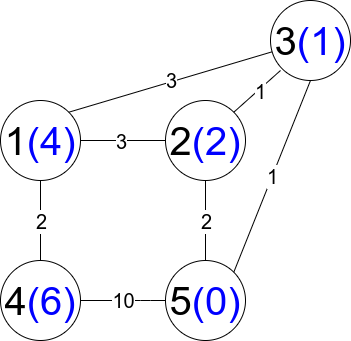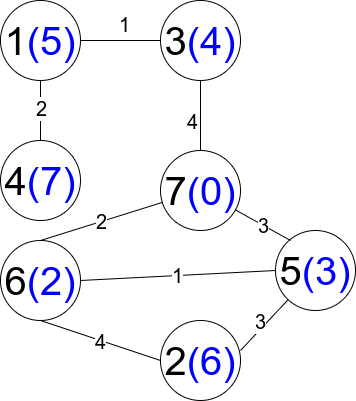Number of Restricted Paths From First to Last Node
There is an undirected weighted connected graph. You are given a positive integer n which denotes that the graph has n nodes labeled from 1 to n, and an array edges where each edges[i] = [ui, vi, weighti] denotes that there is an edge between nodes ui and vi with weight equal to weighti.
A path from node start to node end is a sequence of nodes [z0, z1, z2, ..., zk] such that z0 = start and zk = end and there is an edge between zi and zi+1 where 0 <= i <= k-1.
The distance of a path is the sum of the weights on the edges of the path. Let distanceToLastNode(x) denote the shortest distance of a path between node n and node x. A restricted path is a path that also satisfies that distanceToLastNode(zi) > distanceToLastNode(zi+1) where 0 <= i <= k-1.
Return the number of restricted paths from node 1 to node n. Since that number may be too large, return it modulo 109 + 7.
Example 1:

Input: n = 5, edges = [[1,2,3],[1,3,3],[2,3,1],[1,4,2],[5,2,2],[3,5,1],[5,4,10]] Output: 3 Explanation: Each circle contains the node number in black and its distanceToLastNode value in blue. The three restricted paths are: 1) 1 --> 2 --> 5 2) 1 --> 2 --> 3 --> 5 3) 1 --> 3 --> 5
Example 2:

Input: n = 7, edges = [[1,3,1],[4,1,2],[7,3,4],[2,5,3],[5,6,1],[6,7,2],[7,5,3],[2,6,4]] Output: 1 Explanation: Each circle contains the node number in black and its distanceToLastNode value in blue. The only restricted path is 1 --> 3 --> 7.
Constraints:
- 1 <= n <= 2 * 104
- n - 1 <= edges.length <= 4 * 104
- edges[i].length == 3
- 1 <= ui, vi <= n
- ui != vi
- 1 <= weighti <= 105
- There is at most one edge between any two nodes.
- There is at least one path between any two nodes.
Solution:
class Solution {
int mod = (int) (1e9) + 7;
Map<Integer, Long> memo = new HashMap();
public int countRestrictedPaths(int n, int[][] edges) {
Map<Integer, List<int[]>> graph = new HashMap();
for (int[] edge : edges) {
graph.putIfAbsent(edge[0], new ArrayList());
graph.putIfAbsent(edge[1], new ArrayList());
graph.get(edge[0]).add(new int[]{edge[1], edge[2]});
graph.get(edge[1]).add(new int[]{edge[0], edge[2]});
}
PriorityQueue<int[]> queue = new PriorityQueue<int[]>((a, b) -> Integer.compare(a[1], b[1]));
queue.offer(new int[]{n, 0});
int[] dist = new int[n + 1];
Arrays.fill(dist, Integer.MAX_VALUE);
dist[n] = 0;
while (!queue.isEmpty()) {
int[] curr = queue.poll();
// System.out.println(curr);
int node = curr[0], distance = curr[1];
for (int[] nei : graph.getOrDefault(node, new ArrayList<int[]>())) {
int next = nei[0], w = nei[1];
if (dist[next] > distance + w) {
dist[next] = distance + w;
queue.offer(new int[]{next, distance + w});
}
}
}
long res = dfs(1, graph, n, dist);
return (int )(res % mod);
}
private long dfs(int curr, Map<Integer, List<int[]>> graph, int n, int[] dist) {
if (curr == n) return 1;
if (memo.get(curr) != null) return memo.get(curr);
int currD = dist[curr];
long res = 0;
for (int[] nei : graph.getOrDefault(curr, new ArrayList<>())) {
int next = nei[0];
if (dist[next] < currD) {
res = (res + dfs(next, graph, n, dist)) % mod;
}
}
memo.put(curr, res);
return res;
}
}